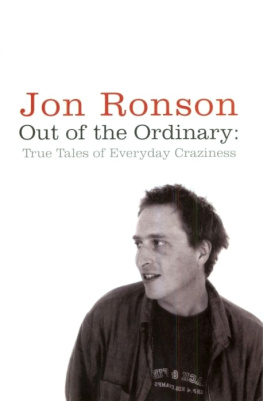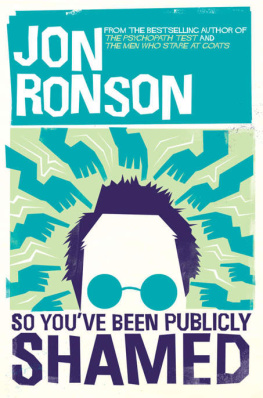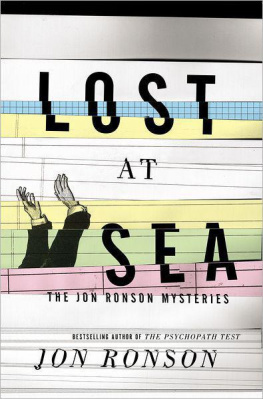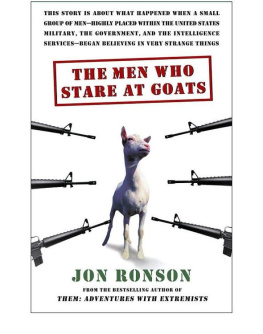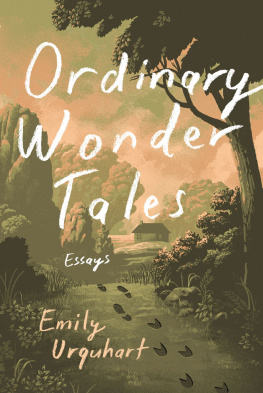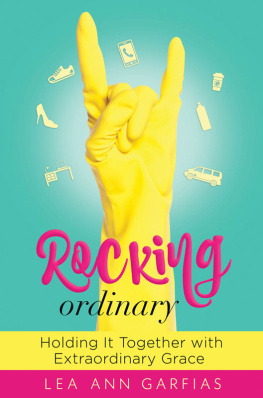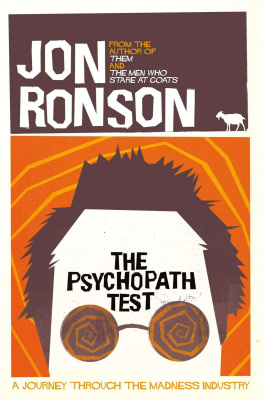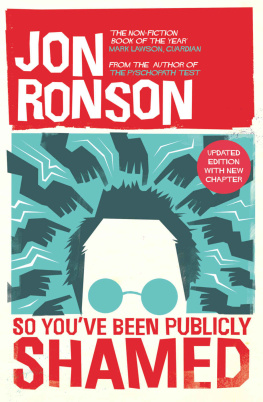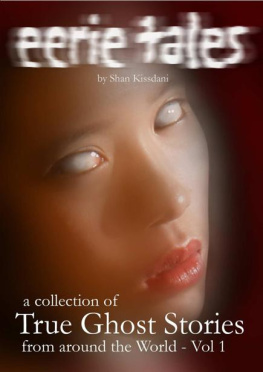Jon Ronson - Out of the Ordinary: True Tales of Everyday Craziness
Here you can read online Jon Ronson - Out of the Ordinary: True Tales of Everyday Craziness full text of the book (entire story) in english for free. Download pdf and epub, get meaning, cover and reviews about this ebook. publisher: Picador, genre: Detective and thriller. Description of the work, (preface) as well as reviews are available. Best literature library LitArk.com created for fans of good reading and offers a wide selection of genres:
Romance novel
Science fiction
Adventure
Detective
Science
History
Home and family
Prose
Art
Politics
Computer
Non-fiction
Religion
Business
Children
Humor
Choose a favorite category and find really read worthwhile books. Enjoy immersion in the world of imagination, feel the emotions of the characters or learn something new for yourself, make an fascinating discovery.
- Book:Out of the Ordinary: True Tales of Everyday Craziness
- Author:
- Publisher:Picador
- Genre:
- Rating:5 / 5
- Favourites:Add to favourites
- Your mark:
- 100
- 1
- 2
- 3
- 4
- 5
Out of the Ordinary: True Tales of Everyday Craziness: summary, description and annotation
We offer to read an annotation, description, summary or preface (depends on what the author of the book "Out of the Ordinary: True Tales of Everyday Craziness" wrote himself). If you haven't found the necessary information about the book — write in the comments, we will try to find it.
Out of the Ordinary: True Tales of Everyday Craziness — read online for free the complete book (whole text) full work
Below is the text of the book, divided by pages. System saving the place of the last page read, allows you to conveniently read the book "Out of the Ordinary: True Tales of Everyday Craziness" online for free, without having to search again every time where you left off. Put a bookmark, and you can go to the page where you finished reading at any time.
Font size:
Interval:
Bookmark:
Jon Ronson
United Kingdom
Out of the Ordinary
True Tales of Everyday Craziness
2006, EN
Jon Ronsons subjects have included people who believe that goats can be killed by the power of a really hard stare, and people who believe that the world is ruled by twelve-foot lizard-men. In Out of the Ordinary, a collection of his journalism from the Guardian, he turns his attention to irrational beliefs much closer to home, investigating the ways in which we sometimes manage to convince ourselves that all manner of lunacy makes perfect sense mainstream, domestic, ordinary insanity. Whether he finds himself promising his son that he will be at his side for ever, dressed in a Santa costume, or trying to understand why hundreds of apparently normal people would suddenly start speaking in tongues in a Scout hut in Kidderminster, he demonstrates repeatedly how we all succumb to deeply irrational beliefs that grow to inform our everyday existence. Out of the Ordinary is Jon Ronson at his inimitable best: hilarious, thought-provoking and with an unerring eye for human frailty not least his own.
T his book begins in 2002 with me promising my four-year-old son Joel that I would stay with him in a Santa costume for the rest of his life. It was, on reflection, among my more stupid acts of parenting. Still, I contend that anyone might have made the same mistake had they taken their eye off the ball for a moment. A few hours later, as I explained to Joel that I was getting a rash, and he ought to prepare himself because I was about to take the beard off, I looked at myself as if from above and realized Id become the kind of person Ive been writing about all these years.
For years Ive been writing about Klansmen and paranoid militant Islamists and extreme conspiracy theorists, people who believe that the world is run by giant lizards whove adopted human form, and US military intelligence chiefs who attempt to kill goats just by staring at them. These people had created for themselves bubbles within which all kinds of crazy thoughts and actions made perfect sense. One thought would spiral into another thought, and before long it was obvious to them that goats could be killed with a look.
It is easy for us more settled, secular, cosmopolitan type of people to look at the goat-starers and lizard-believers and see them as lunatics with character traits that are impossible to relate to. But I too was creating one of those crazy bubbles, only in a more ordinary, domestic setting. It had begun with me attempting to provide my son with an enchanting Christmas, and then one thing spiralled into another, and before I knew it I was making an insanely ill thought-out and possibly emotionally damaging promise about staying with him, in the guise of Santa, forever.
And so I started writing stories and columns about more ordinary craziness taking place in recognizable landscapes. This is a collection of these stories. They all first appeared, in different forms, in the Guardians Weekend magazine, although Ive added postscripts here and there.
In Part One Ive gathered together the stories Ive written about my own moments of domestic craziness. In Part Two Ive collected some stories Ive written about other people how one thing led to another, and before long extraordinary acts were occurring.
There are a few stories that dont immediately seem to fit and consequently, I think, need some explanation as to why theyve been included.
The Fall of a Pop Impresario tells of my year with the pop mogul Jonathan King as he faced trial for a series of child-sex offences. Unlike most of the other people in the book, one would be hard pressed to see Jonathan King and his friends as basically good-hearted people gone temporarily askew. (Another exception, in terms of likeability, is Dave McKay, the leader of the Jesus Christians. On a personal level, I like Dave less than anyone Ive ever interviewed.) But I was interested in the bubble of self-delusion Jonathan King and his friends had created for themselves. The bubble is known, I suppose, as a show-business paedophile ring. Inside it they had convinced themselves that all manner of unpleasant, exploitative, selfish behaviour was perfectly OK. And thats exactly how they see their detractors the police, the victims, the courts, unfriendly journalists as a bubble filled with people who had irrationally convinced themselves that their innocent behaviour was unpleasant, exploitative and selfish.
I probably wouldnt have included the story Blood Sacrifice had it not been for the extraordinary events that occurred as a result of the article appearing in the Guardian. Ive detailed what happened in a long postscript.
The other story that might seem out of place is Citizen Kubrick. This is about my months looking through the boxes Stanley Kubrick left behind at his home near St Albans. I see this as the books happy ending: Kubrick did build for himself a world inside his house that may seem crazy by the standards of outsiders, but as a result he created some of the most wonderful films ever produced. So these bubbles can sometimes be far from malign or silly. They can be great.
Thanks to Kath Viner, Helen Oldfield, Melissa Denes, Hannah Pool, Bob Granleese, Billy Mann, Ritchie Parrott, Merope Mills, Lisa Darnell, Justine Picardie, Nick Hornby, William Fiennes, Sarah Harvey, Stephen Gill, Ira Glass, Jonathan Bernstein, Alex Blumberg, John Hodgman, Geoff Kloske, Sarah Vowell, Ursula Doyle, Camilla Elworthy, Derek Johns, Christine Glover, and Nick Harris.
This book would be dedicated to Katie, Ed, Kellie, Shirley, Sam and the others from jonronson.com had I not dedicated it to Elaine and Joel.
A Fantastic Life
I t is a Friday in December. I have now been dressed as Santa for five hours. The heating in our house is on full blast. The costume was itchy when I put it on all those hours ago. Now I feel as if I am covered in ants. I need to take the beard off, I say.
No! says Joel, my four-year-old son.
Im getting a rash, I say.
Please stay with me, Santa, says Joel.
The original plan had been to creep up behind Joel dressed as Santa. Id say, Ho! Ho! Ho! We would laugh about it, then Id take off the costume and wed go back to normal. But it didnt work out that way. Although Joel knew it was me, he was so thrilled to have his own personal Santa that he didnt want it to end. Three hours ago, he whispered, Will you stay with me for ever, Santa?
I replied, Yes, I will. For ever and ever and ever.
I think I may be allergic to whatever fabric they make the beard out of, I say now.
Dont go, Santa, says Joel. Dont leave me.
I give my wife, Elaine, an imploring look. She shrugs and goes downstairs to the kitchen. She thinks I have nobody to blame for this but myself.
I think Im getting hives, I say. Im feeling very claustrophobic.
No, Santa, no! says Joel.
I need air, I gasp. I need air.
I am having a panic attack dressed as Santa.
Prepare yourself, because I am going to take the beard offnow! I say.
I do. Joel runs from the room. I go upstairs to my office for a cigarette.
In my office I log on to Friends Reunited. A few weeks ago I decided to track down the boys who threw me into Roath Park Lake in Cardiff in the summer of 1983 when I was sixteen. In the middle of the night a few Saturdays ago I woke up and realized I was still angry about what they did. I found one of them and emailed to inform him that I am now a bestselling author.
He emailed me back within a few hours. He told me that the reason why they threw me in the lake back then was that I was a pain in the arse. He added that the tenor of my email leads him to suspect that I havent changed, and that throwing me in the lake again today would be an appropriate response. I emailed him back to say that I earn more money than he does. He has not yet emailed me back.
Next pageFont size:
Interval:
Bookmark:
Similar books «Out of the Ordinary: True Tales of Everyday Craziness»
Look at similar books to Out of the Ordinary: True Tales of Everyday Craziness. We have selected literature similar in name and meaning in the hope of providing readers with more options to find new, interesting, not yet read works.
Discussion, reviews of the book Out of the Ordinary: True Tales of Everyday Craziness and just readers' own opinions. Leave your comments, write what you think about the work, its meaning or the main characters. Specify what exactly you liked and what you didn't like, and why you think so.

